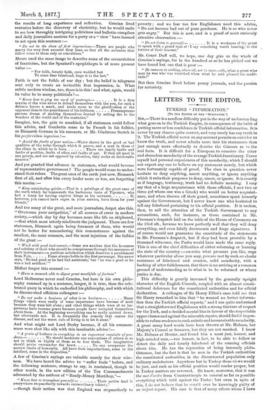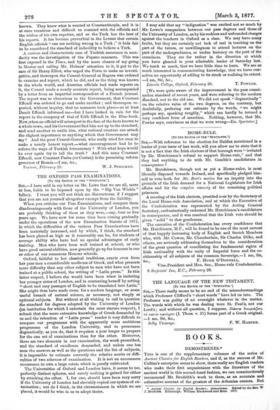LETTERS TO THE EDITOR.
TURKISH "INFORMATION."
[TO THE EDITOR OF THE "SPECTATOR."] Sm,—There is a needless difficulty put in the way of understanding what goes on in the Turkish Empire, in consequence of the habit of putting more or less confidence in Turkish official information. It is never by any chance quite correct, and very rarely has any truth in it. The Turkish official never on any account permits an outsider to know the truth, and never admits more into his statements than just enough more effectually to deceive the Giaours as to the real facts. It is difficult for a European to conceive the utter and shameless mendacity of the average Turkish functionary. I have myself had personal experiences of this mendacity, which I should not expect any one to believe on my statement merely, but which were fortunately capable of proof. The class in question never hesitate to deny anything, assert anything, or ignore anything which it suits their purposes to deny, assert, or ignore. It is exactly as if language, testimony, truth had no definite meaning. I may say that of a large acquaintance with these officials, I met two or three (of whom one was a Greek) who would on better acquaint- ance, and when thrown off their guard, sometimes speak honestly against the Government, but I never knew one who hesitated to tell any falsehood pertaining to his official position. It is useless, then, to call the attention of the Turkish Government to any accusations, such, for instance, as those contained in Mr. Freeman's despatch laid on the table of the House of Commons on the 23rd ult., because we know perfectly well that they will deny everything, and even falsify documents and forge signatures. I of course would not guarantee the exactitude of the statements in Mr. Freeman's despatch, but if they had been provable by a thousand witnesses, the Pasha would have made the same reply. This is one of the chief difficulties of either reforming or learning the state of the country ;—exercise what pressure you like, urge whatever particular abuse you may, you are met by such an elastic resistance of falsehood and evasion, solid mendacity, with a backing of utter faithlessness, that there is no arriving at a common ground of understanding as to what is to be reformed or where justice is due.
This difficulty is greatly increased by the generally upright character of the English Consuls, coupled with an almost consti- tutional deference for the constituted authorities and for official declaration. A colleague of Sir Henry Elliot's once told me that Sir Henry remarked to him that "he wanted no better informa- tion than the Turkish official reports," and I can quite understand that a straightforward Englishman with a strong tincture of respect for the Turk, and a decided mental bias in favour of the respectable upper classes and against the miserable rayahs, should find it impos- sible to refuse credence to such artistic and inconceivable mendacity. A great many hard words have been thrown at Mr. Holmes, her Majesty's Consul at Seraievo, but they are not merited. I knew Mr. Holmes at Mostar, and found him a most just, honest, and high-minded man,—too honest, in fact, to be able to follow or detect the daily and hourly falsehood of the cunning officials about him. He has the reputation of being intensely philo. Ottoman, but the fact is that he sees in the Turkish authorities the constituted authorities, in the discontented population only ordinary malefactors. Anywhere but in Turkey these views would be just, and such as his official position would render proper, but in Turkey matters are reversed. He knew, moreover, that it was the mot d'ordre from Constantinople to conceal as far as possible everything which told against the Turks ; but even in spite of this, I do not believe that he would ever be knowingly guilty of an unjust report. His case is that of many others whom I have
known. They know what is wanted at Constantinople, and it is at once vexatious and difficult to contend with the officials and the wishes of his own superior, and so the Turk has the best of his reports. It has become proverbial in the Levant that certain English officials "can see nothing wrong in a Turk ;" it bide fair to be considered the standard of imbecility to believe a Turk.
A curious and characteristic case of Turkish assurance in men- dacity was the investigation of the Papano massacre. This was first exposed in the Times, and by the mere chance of my going to Mostar and calling Mr. Holmes' attention to it, it got to the ears of Sir Henry Elliot, who urged the Porte to make an investi- gation, and thereupon the Consul-General at Ragusa was ordered to examine and report, which he did, and as the thing was known to the whole world, and Austrian officials had made reports on it, the Consul made a nearly accurate report, being accompanied by a letter from an impartial correspondent of a French journal. The report was so obnoxious to the Government, that Constant Effendi was ordered to go and make another ; and thereupon re- ported, without inquiry, that no massacre took place—so at least Damit Effendi informed me—but I have looked in vain for the report in the company of that of Edib Effendi in the Blue-book. Now,when an official will misreport in the face of the facts known to a whole town, and his Government find him not up to the standard, and send another to outlie him, what rational creature can attach the slighest importance to anything which that Government may say? And the poor Consul-General, who really tried for once to make a nearly honest report,—what encouragement had he to reform the ways of Turkish bureaucracy ? With what hope would he ever again try to tell the truth ? And this same Constant Effendi, now Constant Pasha (or Costan) is the promising reform governor of Bosnia.—I am, &c.,



































 Previous page
Previous page